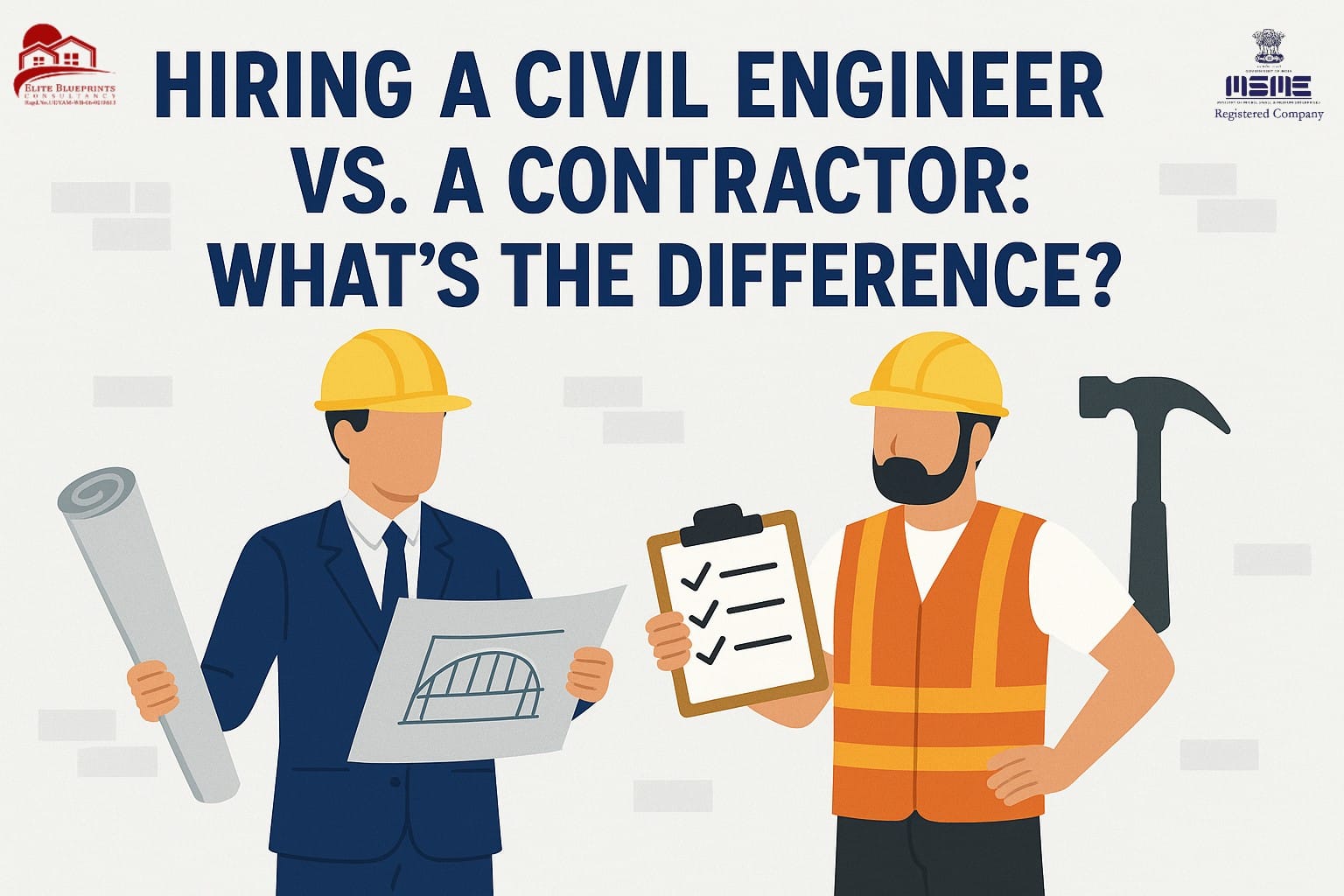Why Choosing the Right Professional is the Key to Construction Success
When starting any building project — whether it’s a residential home, commercial complex, or industrial structure — most people ask:
“Should I hire a civil engineer or a contractor?”
It’s a common confusion, and the answer depends on your goals, budget, and the scale of the project. In the world of civil engineering and architecture, both civil engineering consultants and contractors play vital roles — but their expertise, responsibilities, and project involvement differ significantly.
Let’s break it down to help you make an informed choice for your next project.
Understanding the Roles: Civil Engineer vs. Contractor
| Role | Civil Engineer | Contractor |
| Focus | Design, planning, technical supervision | Execution of construction based on approved plans |
| Qualification | Engineering degree, licensed professional | Typically non-engineering background, experienced in trade |
| Responsibilities | Structural design, quality checks, cost estimation | Labor management, materials, and on-site implementation |
| Reports to | Client or Architect | Often reports to the Engineer or Project Manager |
| Primary Goal | Safety, durability, technical accuracy | Timely project delivery and cost-effective execution |
When Should You Hire a Civil Engineer?
You should hire a civil engineering consultant when your project demands:
- Structural safety and load calculations
- Soil testing and foundation design
- Detailed project planning and feasibility reports
- Construction quality control and supervision
- Bill of Quantities (BOQ) and cost estimation
- Compliance with local building codes
A civil engineer is essential in projects where structural stability, design precision, and long-term durability are critical — especially in multi-story buildings, bridges, basements, retaining walls, or large-scale commercial buildings.
When Should You Hire a Contractor?
You should hire a contractor when your project enters the execution stage and requires:
- On-ground construction labor
- Procurement and transportation of building materials
- Timely completion as per civil or architectural plan
- Finishing work like painting, tiling, and plumbing
- Workforce and site coordination
Contractors are ideal for implementing a plan that has already been developed and approved by an architect or civil engineer.
Read also: Key Concepts in Building Planning and Design
Civil Engineering and Architecture: How Engineers and Contractors Collaborate
In a well-organized construction project, civil engineers and contractors work together, not independently. Here’s how the collaboration looks:
| Task | Who Leads? |
| Site survey & layout | Civil Engineer |
| Foundation work | Contractor (under supervision) |
| Structural design approval | Civil Engineer |
| Material selection | Civil Engineer + Contractor |
| Brickwork & concreting | Contractor |
| Quality checks & inspection | Civil Engineer |
| Handover & documentation | Both |
Can a Contractor Replace a Civil Engineer?
No — and doing so is a major risk.
While experienced contractors may claim they can “handle everything,” skipping professional civil engineering consultants can lead to:
- Structural defects
- Legal complications
- Cost overruns
- Delayed approvals
- Lack of safety assurance
The engineer ensures your structure isn’t just built — it’s built to last.
Choosing the Right Professional for Your Project
Here’s a simple guide to who you need at different stages:
| Project Stage | Who to Hire |
| Feasibility & Planning | Civil Engineering Consultant |
| Architectural Design | Architect (in collaboration with engineer) |
| Site Execution | Contractor (under engineer’s guidance) |
| Finishing Work | Contractor + Interior Designer |
| Post-construction Audit | Civil Engineer |
Conclusion: Don’t Just Build — Build Right
The difference between a civil engineer and a contractor is not about better or worse — it’s about purpose.
Hire a civil engineer to guide your project safely, accurately, and legally. Hire a contractor to bring that plan to life efficiently.
When it comes to civil engineering and architecture, skipping either role compromises your vision and safety.
Read also: Indian House Exterior Design or Full Home Construction: Which Should You Focus on First?
Looking for Trusted Civil Engineering Consultants and Experienced Contractors?
At Elite Blueprints Consultancy, we offer end-to-end services — from civil design and structural safety to turnkey construction and execution.
Whether it’s a home, office, or commercial building, our experts ensure quality, compliance, and timely delivery under one roof.
📞 Call Us Today: +91-82500 86323, +91-90462 50581
🌐 Visit: www.ebcsiliguri.com
📍 Based in Siliguri | Serving India
Let’s build smarter, stronger, and safer — together.
FAQs: Hiring Civil Engineers vs. Contractors
Q1: Can I just hire a contractor and skip the civil engineer to save cost?
Not advisable. It may save money initially but can cost you heavily in repairs, safety issues, and lack of compliance later.
Q2: Who prepares the building plan — civil engineer or contractor?
The civil engineer or architect prepares the design and drawings. Contractors only execute the approved plan.
Q3: Are civil engineering consultants required for home renovation?
Yes, if the renovation includes structural changes, additional floors, or wall demolition.
Read also: A Guide to Building Layout in Construction




Comments are closed